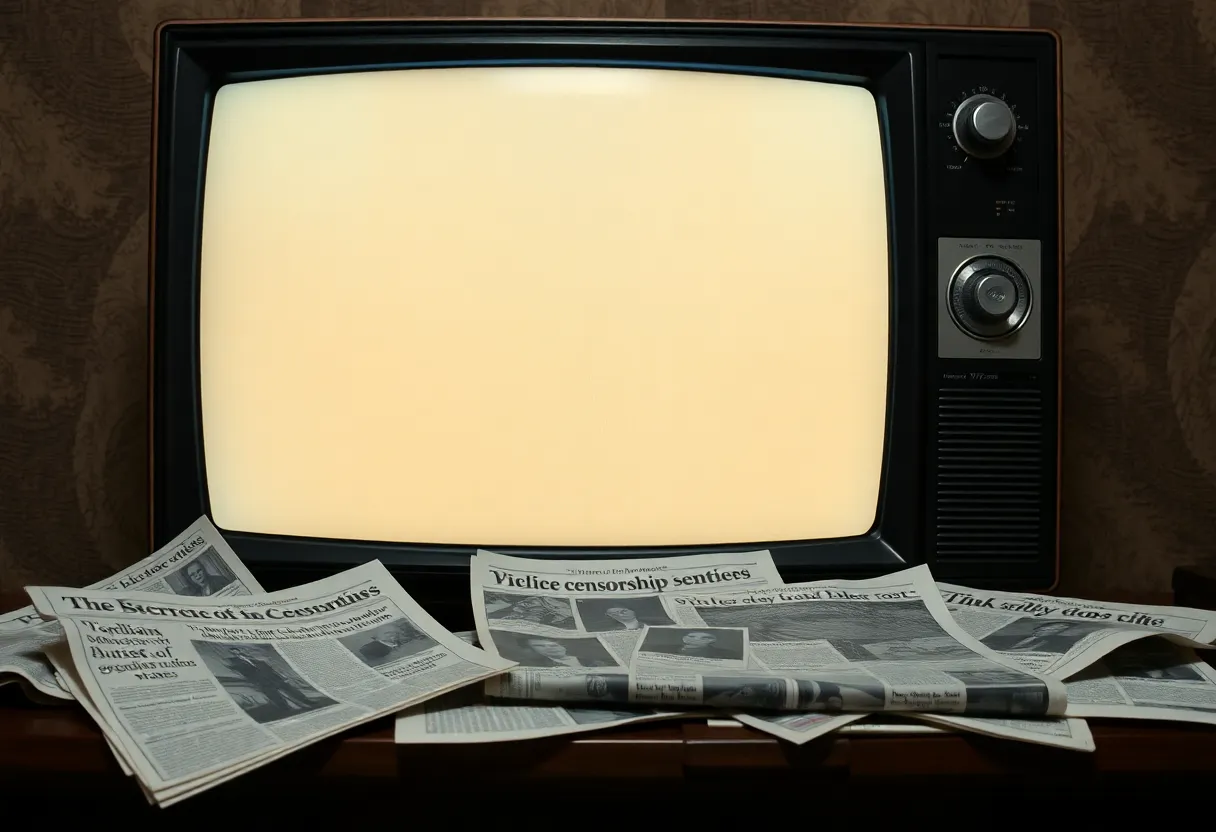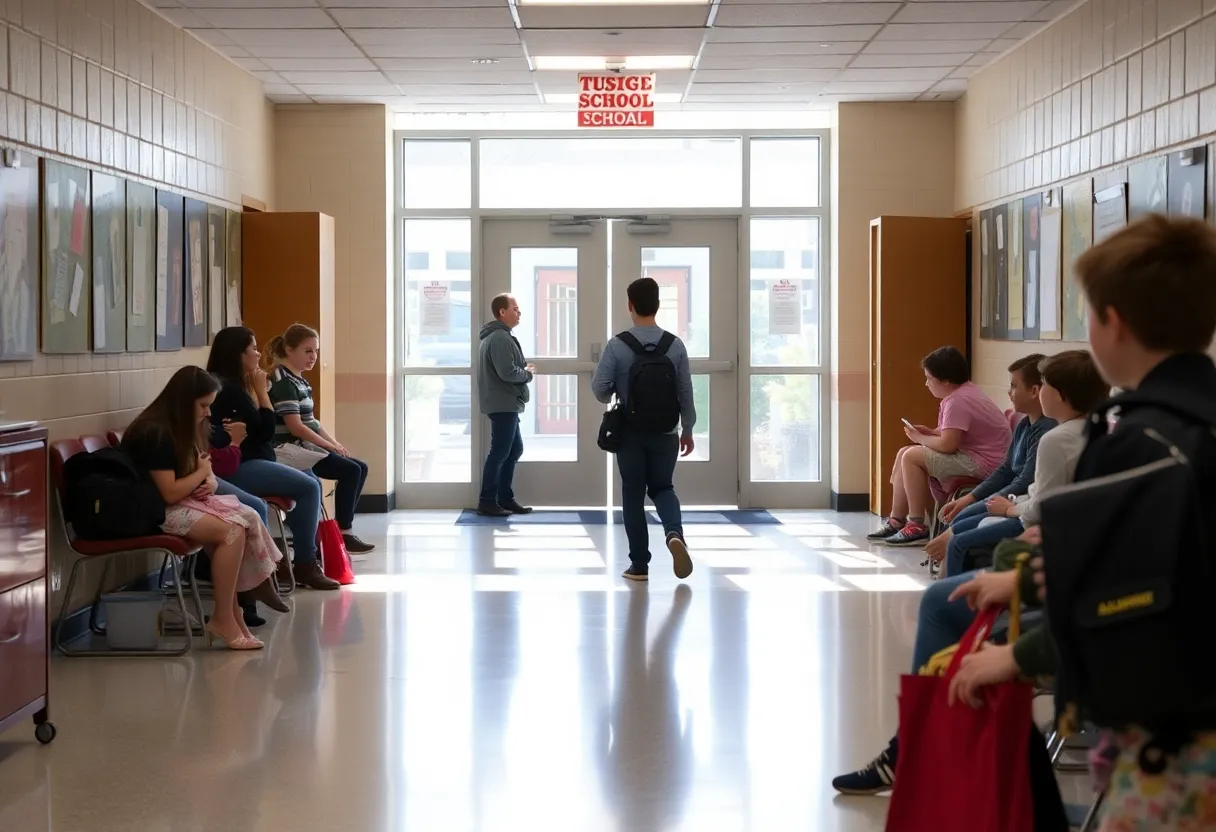Washington, D.C., September 22, 2025
News Summary
CBS’s termination of ‘The Late Show with Stephen Colbert’ and ABC’s indefinite suspension of ‘The Jimmy Kimmel Show’ have sparked significant political discourse. Both decisions, attributed to lawsuits and controversial comments, raise concerns over censorship and government influence in media. Critics argue that these changes exemplify selective support for free speech, particularly towards conservative narratives. In the backdrop, FCC Chairman Brendan Carr faces criticism for his threatening remarks regarding media content, triggering legislative responses aimed at safeguarding journalistic independence and free expression.
Washington, D.C.
Major late-night programs pulled amid political backlash
CBS ended “The Late Show with Stephen Colbert” after settling a lawsuit related to “Sixty Minutes” from Donald Trump. At the same time, ABC has indefinitely pulled “The Jimmy Kimmel Show” due to comments made about conservative activist Charlie Kirk, leading to accusations of censorship. These high-profile programming changes have intensified debate over government influence, corporate decision-making, and the limits of free expression in broadcast media.
Immediate impacts and reactions
The network actions prompted claims from multiple quarters that political pressure, rather than editorial judgment or audience considerations alone, influenced programming choices. Critics argue that selective enforcement of free-speech principles is becoming more visible in public discourse. Specifically, reports indicate conservative opinion supports freedom of speech only for their own narratives, and some observers perceive increased targeting of liberal voices.
Questions have also been raised about the tone and implications of public statements from regulatory figures. FCC Chairman Brendan Carr has been criticized for sounding like an organized crime boss when discussing the potential consequences for broadcasting companies if they do not align their content with certain political viewpoints. That commentary drew legislative and public scrutiny and prompted responses from elected officials.
Senator Ted Cruz voiced strong disapproval of Carr’s comments, stating it poses a danger of government censorship, which could ultimately silence conservative voices. In turn, the president expressed support for the FCC chair and was reported to have praised the chairman, described him as courageous and reiterated complaints about negative media coverage of his administration.
Regulatory authority and legal options
The FCC has authority over broadcasting licenses, which can be revoked based on the premise of serving the public interest. That regulatory power is central to the debate because it links federal oversight to the continued operation of broadcast outlets. Some lawmakers warn that aggressive interpretation or public pressure around that authority could create a chilling effect on journalism and entertainment.
In response to these concerns, U.S. Rep. Jasmine Crockett introduced legislation to prevent the FCC from compelling regulated companies to adopt or suppress political viewpoints. The proposed legislation aims to codify limits on agency influence over content decisions by companies that hold broadcast licenses.
Broader concerns and political context
Observers frame the situation in broader constitutional terms. There is widespread concern about the administration’s disregard for constitutional protections, including habeas corpus and free speech, particularly for liberal thinkers. The debate also touches on public perceptions of “cancel culture.” The censorship in media is equated to a form of “cancel culture,” with both political sides calling out the suppression of opposing views.
Supporters of stricter oversight argue that broadcasting companies have an obligation to serve the public interest and that regulators must ensure fairness. Opponents contend that government pressure or threats related to licensing could amount to coercion and undermine media independence. The exchange of accusations — including claims that some conservatives advocate free-speech protections only for viewpoints they favor — has contributed to heightened polarization on media policy.
Ongoing developments
Legislative proposals and public statements from officials are expected to continue shaping the debate. Networks that altered programming have cited legal settlements, internal reviews, and reputational concerns as factors in their decisions. Lawmakers, regulators, and advocacy groups are preparing for hearings and potential court challenges related to the issues raised.
What to watch next
- Progress of the legislation introduced by U.S. Rep. Jasmine Crockett concerning FCC authority and political viewpoints.
- Any formal actions or rule changes by the FCC related to broadcast licensing and content oversight.
- Legal developments related to the lawsuit settlement that preceded the end of the late-night program mentioned above.
- Public reaction from viewers, advertisers, and industry groups to the programming changes and regulatory commentary.
FAQ
- What happened to major late-night shows?
- CBS ended “The Late Show with Stephen Colbert” after settling a lawsuit related to “Sixty Minutes” from Donald Trump.
- Why did ABC pull a late-night program?
- ABC has indefinitely pulled “The Jimmy Kimmel Show” due to comments made about conservative activist Charlie Kirk, leading to accusations of censorship.
- What criticisms have been made about the FCC chairman?
- FCC Chairman Brendan Carr has been criticized for sounding like an organized crime boss when discussing the potential consequences for broadcasting companies if they do not align their content with certain political viewpoints.
- How did Senator Ted Cruz respond?
- Senator Ted Cruz voiced strong disapproval of Carr’s comments, stating it poses a danger of government censorship, which could ultimately silence conservative voices.
- What is the FCC’s authority over broadcasters?
- The FCC has authority over broadcasting licenses, which can be revoked based on the premise of serving the public interest.
- Are there legislative responses?
- U.S. Rep. Jasmine Crockett introduced legislation to prevent the FCC from compelling regulated companies to adopt or suppress political viewpoints.
- Are there broader constitutional concerns?
- There is widespread concern about the administration’s disregard for constitutional protections, including habeas corpus and free speech, particularly for liberal thinkers.
- What do reports say about conservative views on free speech?
- Reports indicate conservative opinion supports freedom of speech only for their own narratives.
- How is media censorship being characterized?
- The censorship in media is equated to a form of “cancel culture,” with both political sides calling out the suppression of opposing views.
| Feature | Detail |
|---|---|
| Program changes | CBS ended “The Late Show with Stephen Colbert”; ABC has indefinitely pulled “The Jimmy Kimmel Show”. |
| Primary reasons cited | Lawsuit settlement related to “Sixty Minutes” from Donald Trump; comments about conservative activist Charlie Kirk. |
| Regulatory concern | FCC Chairman Brendan Carr criticized for comments about consequences to broadcasters; FCC has authority over broadcasting licenses. |
| Legislative response | U.S. Rep. Jasmine Crockett introduced legislation to limit FCC compulsion on political viewpoints. |
| Broader issues | Concerns about free speech, habeas corpus, cancel culture, and selective support for freedom of expression. |
Deeper Dive: News & Info About This Topic
HERE Resources
Additional Resources
- Dallas News: Ted Cruz Says FCC Chair Sounded Like a Mafia Boss
- Statesman: University of Texas Lawsuit over Free Speech Policy
- CultureMap: Bishop Arts Theatre Center Season Announcement
- Dallas Express: Is Trump Doing Enough to Protect Free Speech?
- Dallas Weekly: Trump Administration’s Threat to Free Press
- Wikipedia: Free Speech
- Google Search: Free Speech Law
- Google Scholar: Media Censorship
- Encyclopedia Britannica: Free Speech
- Google News: Censorship

Author: STAFF HERE DALLAS WRITER
The DALLAS STAFF WRITER represents the experienced team at HEREDallas.com, your go-to source for actionable local news and information in Dallas, Dallas County, and beyond. Specializing in "news you can use," we cover essential topics like product reviews for personal and business needs, local business directories, politics, real estate trends, neighborhood insights, and state news affecting the area—with deep expertise drawn from years of dedicated reporting and strong community input, including local press releases and business updates. We deliver top reporting on high-value events such as the State Fair of Texas, Deep Ellum Arts Festival, and Dallas International Film Festival. Our coverage extends to key organizations like the Dallas Regional Chamber and United Way of Metropolitan Dallas, plus leading businesses in telecommunications, aviation, and semiconductors that power the local economy such as AT&T, Southwest Airlines, and Texas Instruments. As part of the broader HERE network, including HEREAustinTX.com, HERECollegeStation.com, HEREHouston.com, and HERESanAntonio.com, we provide comprehensive, credible insights into Texas's dynamic landscape.




